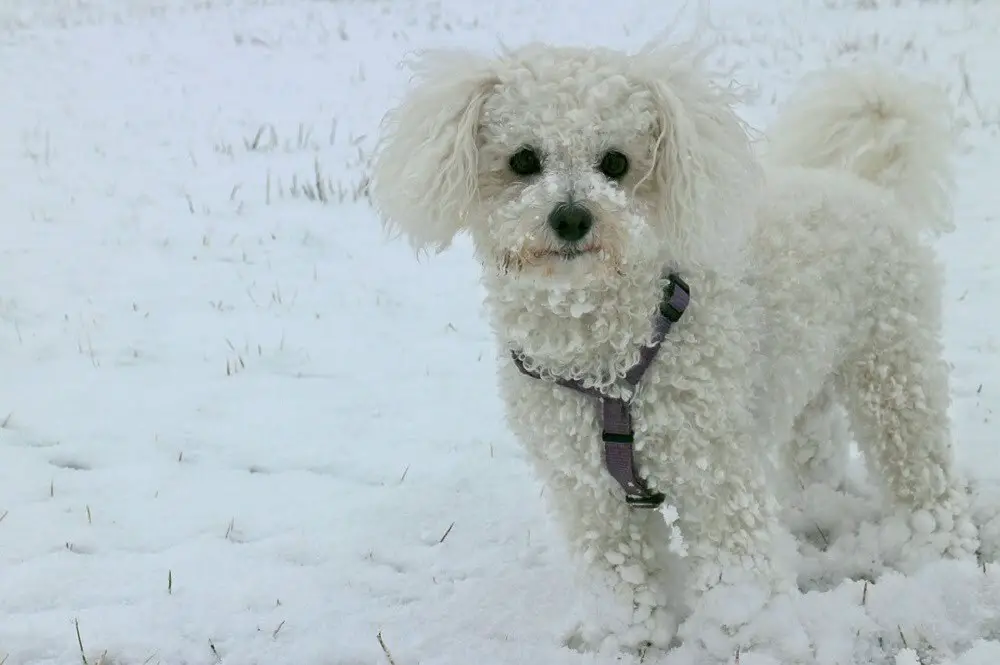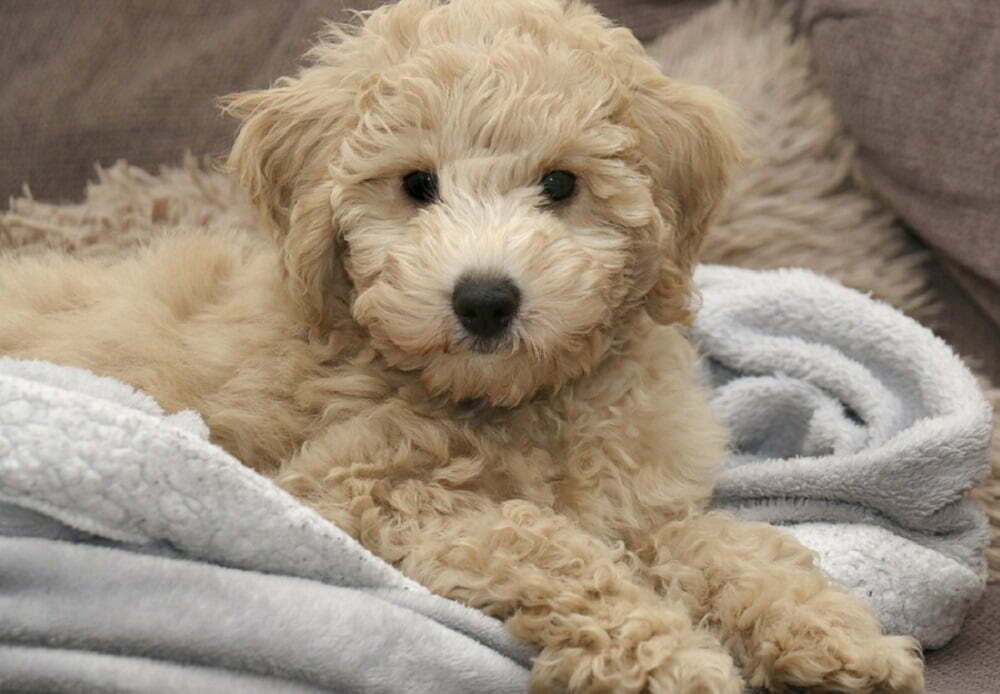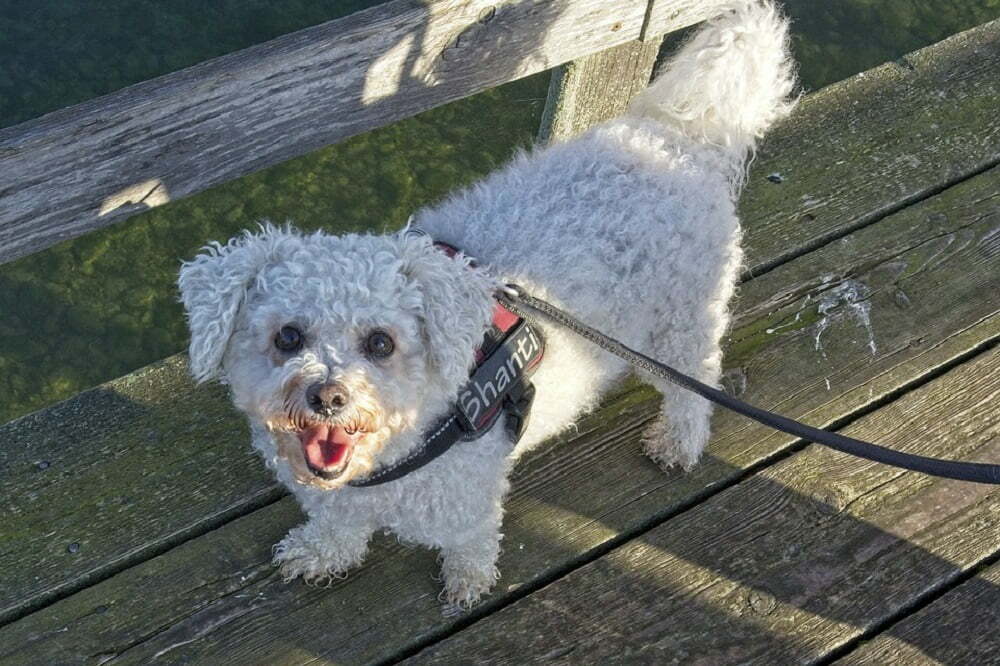Key Facts
Average lifespan
The average lifespan of a bichon frise dog is typically over 12 years. However, they may even reach the ripe old age of around 14 to 15 years. This is an impressive lifespan for dogs, especially given a bichon frise’s small size. Of course, the exact lifespan will depend on the individual dog and their health and lifestyle.
Minimum exercise (per day)
Buchon frise dogs need daily exercise to help them burn up some of their energy. At a minimum, they need around 30 minutes of exercise every day, whether through walking or playing in the home or garden.
Coat length
They have a medium coat length but because of the texture of their fur (they look as though they have had a perm) they often need grooming and upkeep on their coats. As well as this, their coats are almost always totally white, and so they may need lots of cleaning (more on this later).
Minimum cost (per month)
The minimum cost of a bichon frise per month is around $97 when taking into account average diets, grooming costs, and general wellbeing. This may differ if they have health issues.

Appearance
Size
Bichon frises are typically classed as small size dogs, hence their reputation as lap dogs. They still have lots of energy though, which is often surprising considering their smaller stature.
Average height
Bichon frise dogs are relatively small and can reach around 9.5 inches up to 11.5 inches on average. Of course, some may be smaller and some slightly bigger.
Average weight
Their average weight is anything between 12 to 18 pounds in a healthy Bichon Frise. This can depend more or less on their diet and activity levels, as well as any health conditions they may have.
Temperament
Apartment Living
Generally, a smaller dog such as a bichon frise is a great choice for owners who live in an apartment complex. They are small enough that they will need less room to run around in and provided they have at least 30 minutes of exercise each day, they will cope well in an apartment.
Just ensure that the daily exercise involves them walking outdoors in a park, on the street, or somewhere where they can run around and stretch their legs. Because of their reputation as lap dogs, they will very likely enjoy being close to you in your apartment.
However, it is important to bear in mind that all bichon fries are different and that they may react in a different way, depending on the temperament of the individual dog.
Good for novice owners
Bichons can be a good choice of dog breed for the novice owner since they generally have good health and require just 30 minutes of walking each day. That being said, they do have high demands in terms of grooming, and so you should be prepared to cope with this or take them to a professional dog groomer on a regular basis.
Sensitivity level
Bichon frise is a dog breed that has quite high sensitivity levels. They can be very sensitive to the moods of their humans and can be quite responsive and intuitive when it comes to the things going on around them. This means that if you live in a very busy home or have kids who are particularly loud and boisterous, or if you have lots of people over at the same time, then bichon’s may not be the best choice for you.
Tolerates Being Alone
Bichon frises can often experience separation anxiety. They do not tend to like being left alone. If it is for an hour or so then your bichon may be ok, but they tend to get quite clingy to their owners. If you lead a busy lifestyle and you are not home often then a bichon frise may not be the best choice for you.
Tolerates Cold Weather
Bichon frises tend to have an above average tolerance for cold weather. This means they can happily live in areas of the world prone to cold weather.
That being said, they should always be kept warm and comfortable in the cold weather so that they do not become susceptible to illness and low temperatures that can cause health issues,
Tolerates Hot Weather
Like all dogs, bichon frises must be protected in warm weather. They do have a pretty good tolerance for heat and sun, perhaps due to their history in the Mediterranean.
That being said, they should be protected from severe heat, kept as cool as possible, and given lots of water to keep hydrated.
Affectionate With Family
Bichon frise is a very affectionate breed. They are known as lap dogs because they enjoy being up on their humans’ laps, receiving cuddles, pats, scratches, and strokes. They are excellent family dogs and will provide affectionate companionship for their whole lives.
Kid-Friendly
Bichon frises are brilliant family dogs since they get on so well with children. Of course, as with any animal, they should never be left alone with babies or young children, especially if they are puppies or are old, frail, or unwell in any way.
As well as this, these gorgeous dogs love attention and cuddles. With this in mind, provided the children are taught how to properly handle a dog and care for it, your Bichon and child should get one well.
Dog Friendly
Generally, the bichon frise breed is known to get on well with other pets, especially other dogs. They even get on well with dogs of other breeds, provided the other dog is not too boisterous.
They are generally friendly but can be easily frightened, due to their smaller size. This means that louder, bigger, and more active dogs will sometimes be perceived as a threat which can trigger fear aggression in the bichon. This may cause them to growl, bark, and even bite.
Luckily, this can be trained out of them and will involve you ensuring the dogs are introduced to other animals from an early age to ensure they are comfortable. You should always keep your bichon on a leash when meeting other animals for the first time and never leave them alone together.
Friendly Toward Strangers
Bichon frise can be friendly toward strangers but it depends on the bichon themself, as it may well depend on their own temperament. Some are shy and standoffish, whereas others are friendly and enjoy meeting new friends.
Health And Grooming

Shedding
Bichons do not typically shed a lot, however, it is possible for them to lose dead hair. If this is not removed by grooming and brushing, there is a risk of matting, tangling, and dry skin.
Drooling
Bichon frise, as with most dogs, can indeed drool. This happens when they are scared, stressed, and even excited. It is usually normal, but if for any reason they are drooling more than normal or if you are worried, you should take your bichon frise to the vet.
Grooming
Bichon frise is a high maintenance breed and their fur needs grooming often. It is white and curly, meaning you will need to work hard to keep them clean and fluffy.
You should take your bichon frise to the groomers every 4 to 6 weeks! You should also brush your bichon frise twice a week, as well as bathing them regularly.
Your bichon frise will also need to have their claws trimmed regularly. You should also bear in mind that they may need medicated creams and shampoos if they become sensitive or have allergies to their skin. Your vet can advise you on this.
General health
Generally, a bichon frise is a very healthy dog. However, there are some specific health conditions that bichon frise as a breed can be prone to. Keep on reading to find out more in the next section.
Common health problems
Whilst bichon frise dogs can be relatively healthy dogs, there are some health conditions that the breed can be prone to.
In particular, they can be prone to issues such as bladder problems, hip dysplasia, allergies, patellar luxation, and cataracts. Allergies are a particular issue since bichon frise are especially sensitive. Their skin is prone to dryness and eczema.
Potential For Weight Gain
As with all living things, weight gain is always a potential. If your bichon frise does not get enough exercise or they are fed too much (or both!), then they are at risk of becoming overweight.
You can prevent this by feeding them a nutritious diet and ensuring they get at least 30 minutes of exercise every day.
Trainability
Easy To Train
Bichons have a reputation for being pretty easy to train. When they first became popular in the 16th century, it was quickly realized how easy they would be to teach tricks.
These days, owners are often surprised at how quickly bichon frises adapt to general training and fun tricks like ‘paw’, ‘stand’, and ‘turn around’.
They are willing and eager to please their humans, but you should always keep in mind that these are very sensitive dogs.
Because of their sensitivity, you should never use harsh training methods (nor should you use harsh training methods with any animal for that matter!) to teach them new tricks. Positive reinforcement and lots of treats are the best way to teach these fluffy little cuties.
Intelligence
It may come as no surprise that bichon frises are very intelligent animals. Like most dogs, they adapt well to new surroundings and are very easy to teach and train.
They thrive on praise and are very eager to learn and please.
Their intelligence means that they are very intuitive and sensitive to their owners, and so you should always treat them lovingly, being firm but gentle when giving them commands.
Potential to bite
It goes without saying that all dogs as with all animals have the potential to bite you. Biting happens for a variety of reasons.
As a pup, your bichon may bite in a playful way. This is how puppies behave in a litter since they bite their littermates in a friendly and mischievous way. Luckily, you can train that out of your bichon, but if it isn’t trained out, then there is a potential for your adult bichon frise to use biting as a way of playing.
Many dogs will also bite from fear or stress. They will act defensively, especially if they feel as though they are under threat.
Bichons all have these potentials, but in general, they are very easygoing, and it is unlikely that any biting will be a major issue. If you are concerned that your bichon has not grown out of its biting phase as a pup then you should consult your vet as there may be an underlying reason.
Tendency To Bark Or Howl
Bichon frises can bark and howl a lot. This is often looked at as one of the only downsides of owning this breed. They do have a tendency to bark often, as this is their way of communicating.
They are relatively needy dogs and need lots of attention and training. If they do not receive adequate training and are not receiving enough attention from their humans then you can expect them to bark or howl, especially when they are left alone.
History

The bichon frise belongs to the family of dogs known as the Barbichon family. This family also contains the Maltese, the Havanese, and the Bolognese dogs.
The breed began life (or so it is claimed) on the island of Tenerife. This is the largest of the Canary Islands. They quickly became popular dogs, especially with the sailors that visited the island.
They have long been a favorite of European noble families, particularly in Spain and the surrounding Canary and Balearic Islands, France, and Italy.
They were often owned by nobles, and have been noted as far back as the 13th century. They began to be depicted in artwork of these eras, demonstrating just how important the breed was.
After the French Revolution, however, the status of bichon frises was dwindling. Their wealthy owners were all killed or taken to prison, leaving the bichons homeless. This led to many of them living on the streets.
However, this did not last long as it was soon realized that these clever dogs could earn the poor people a pretty penny!
They soon saw that these dogs could easily be taught tricks, meaning the poor people could charge passersby in return for a trick. The bichon frise soon became known as a circus or street performer, and their reputation slowly returned.
Over time, the popularity grew, and in the 20th century, the breed was once again thriving. That is until the world wars hit! Many bichons became ownerless again, and less and less of them were being bred.
The population began to dwindle (as it did with many dogs). However, these dogs still had some loyal companions, and the breed was once again saved through the remaining owners of bichons.
So much so that in 1933 they were finally recognized in France by the Societé Centrale Canine as the Bichon a Poil Frisé. This translates to the “Bichon of curly hair.”
Fast forward to today and bichons are still a very popular dog. In 1964, the first official Bichon Frise club was born. This occurred in San Diego and was known as the Bichon Frise Club of America.
Their accolades did not just stop there! They became a part of the American Kennel Association in 1971 as a part of the miscellaneous class and are a much-desired breed.
The 1990s and early noughties had a particular demand for them, and whilst it has dwindled a little now, there is no denying that the bichon frise is still very much loved.
Costs
In recent years, the demand for all dogs has increased a great deal! This rises and falls very often, but in general, it has seen a steady rise. This means the prices of dogs, especially puppies, are at an all-time high.
At the moment, you can expect to buy a bichon frise pup for upwards of $1000. It is not uncommon to see them for around $2500, in fact! There was a time when you could get them for as low as $250, and around $650 on average. However, it does not seem that the price will decrease in the near future!
Fun Facts
- Bichon frise dogs were a very popular breed among European nobles from Spain, France, and Italy.
- The bichon frise is depicted in many works of art, especially those created in 16th century Europe. This is because of their popularity among the nobility as lap dogs. Look at some of the works of Titian, Francisco de Goya, and Sir Joshua Reynolds, to name but a few!
